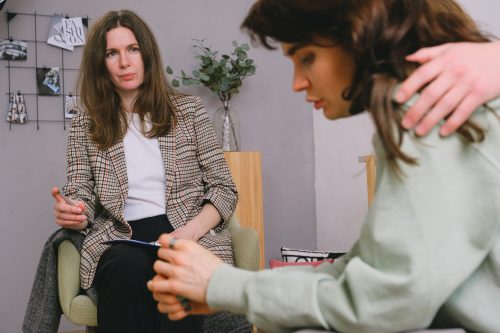Are you tired of your routine sessions with your therapist? Are you looking for something fun and exciting to do instead of your usual counseling?
Going to your first therapy session isn’t something to be scared of, in fact, it is the best thing to do when you have mental health concerns such as anxiety or depression. And you may already be familiar with the usual activities that come along with psychotherapy. These may include writing a journal, daily exercises, and meditation.
But sometimes, you may want to explore other avenues to spice up your therapy sessions. Fortunately, there are different types of therapy that you can try out. You can find some of the more popular ones below.
1. Laughter Therapy

Laughter therapy uses humor to help relieve pain and stress. It aims to improve a person’s mood and overall well-being. It will typically include various activities like laughter exercises. You might watch comedy shows and movies, read books and comics, or something else.
Laughter therapy uses the medically proven benefits of laughter. It draws people together and gives a very positive atmosphere. Aside from boosting your mood and well-being, laughing may even strengthen your immune system. Positive thoughts help release neuropeptides and endorphins that help fight stress and combat other illnesses. Furthermore, laughter enhances oxygen intake, which stimulates the heart, lungs, and muscles. You may do laughter therapy together with a support group or alone at home.
Laughter therapy might also accompany other activities. One example is yoga. Laughter yoga involves learning how to laugh on purpose. What many people don’t know is that our bodies can’t distinguish between real and forced laughter. Both of them have the same positive effect on you and your body.
The idea of laughing about nothing may make some feel awkward and deter them from trying out laughter therapy. But, finding something to laugh at healthily is very scarce, especially in the pandemic. You can definitely do with a glimmer of humor in your day.
2. Nature Therapy
There are times when we can’t stop our minds from racing. Sometimes, too many thoughts in our heads interfere with our daily activities. We need the space to get out of our heads and relax our minds in times like those. Being in solitude gives us a moment of peace to collect ourselves again. Nature therapy uses these ideas to help you.

Nature therapy may also involve going to sessions in a camp outside the city. There, you’ll participate in nature activities in between your therapy sessions. It’s a completely different scene from your therapist’s fluorescent-lit office. This way, you still get on with your counseling while enjoying the fresh air.
Studies have shown that increased urbanization may cause increased levels of stress, anxiety, and depression. Conversely, living in a rural setting or being near lots of green spaces could decrease it. People who go out less frequently also show more signs of depression than those who go out more often. So go out and enjoy the sun as part of your therapy.
3. Art Therapy

Art therapy uses the creative process of various art fields to treat people with mental health problems. The act of creating art helps develop a sense of self-awareness. It helps us explore the many emotions we feel and raises self-esteem. It also improves cognitive and sensorimotor functions. If you’re struggling with anxiety, depression, or addiction, art therapy can be a great help.
Professional art therapists facilitate several different activities and workshops you can explore. These may be in the form of attending art workshops or using adult coloring books. Alternatively, grab some paint and a canvas on your own. With the guidance of a professional art therapist, clients can express their unspoken thoughts. Your emotions can come out through your art. Art therapists also work with hospitals, schools, and veteran’s clinics. You can also visit their private practice.
Art therapy can also be a healing process you can do as a group. You can get your friends, family, or the whole community involved in a large-scale project! Some art therapy workshops aren’t limited by age. This way, you get to strengthen your relationships and enhance your social skills. At the end of the workshop, you get the satisfaction of seeing the fruits of your collaboration.
4. Pet Therapy
Did you know that your pets can assist you on your road to recovery? We all know that our four-legged furry friends can really help uplift your mood and help you feel rejuvenated after a long and tiring day. And this seems to be supported by science. Indeed, having pets during therapy sessions has shown a significant reduction in anxiety, depression, and fatigue.
Therapists and facilities that offer pet therapy have specially trained animals. Dogs and cats are the most common choice of pets for pet therapy. However, there are also times when a therapist uses horses, guinea pigs, and rabbits.

Meanwhile, therapy animals are specially trained to be sociable enough to provide comfort and companionship to patients. They are also not limited to your therapy facility. Some hospitals also use therapy animals and pet therapy to improve the mental health of their patients. They keep patients company during their road to recovery. They are also present in nursing homes, giving smiles and laughter to their residents.
People who seek the assistance of animals vary based on their needs. Some may be completely dependent on their pets for emotional support. Others may enjoy the benefits of visiting a service animal. Both of these are entirely acceptable. One thing is for sure: being with animals gives us a different sense of calm and joy.
Conclusion
There are many alternatives to conventional therapy out there. And they all bring several benefits to the table. You won’t be remiss in exploring these options if you want a change of pace. However, these activities are not a replacement for psychotherapy. These activities can help by applying these therapies in conjunction with talk therapy. Consult with your therapist to see which treatment plan is best for you.


